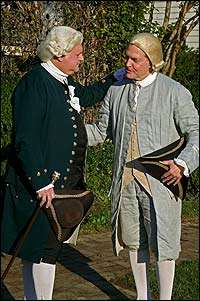John Randolph (loyalist)

John Randolph (1727 – January 31, 1784) was an American lawyer politician from Williamsburg in the British colony of Virginia. He served as king's attorney for Virginia from 1766 until he left for Britain at the outset of the American Revolution.
Randolph was born in Williamsburg into one of the most prominent families of Virginia. His father was Sir John Randolph, the only colonial Virginian to be knighted. The younger Randolph was a close friend of Thomas Jefferson, his cousin, with whom he often played violin.
He married Ariana Jenings (c.1727-1808) on July 26, 1750 in Annapolis, Maryland. They had three children.
During the revolutionary crisis, Randolph remained a Loyalist, unlike his brother Peyton Randolph, and his son, Edmund Randolph. In 1774, he wrote "Considerations on the Present State of Virginia", in which he called for reconciliation between his fellow colonists and Great Britain. He boycotted the Virginia Convention, an extralegal convening of the House of Burgesses headed by his brother Peyton. When hostilities began, Randolph fled to Scotland with Governor Dunmore. In Scotland, Randolph continued to promote reconciliation between Great Britain and the colonies.
When Randolph died in Brompton, London, in 1784, his last request was to be buried in Virginia. His remains were returned and he is interred in the chapel at The College of William and Mary in Williamsburg. His son Edmund became Governor of Virginia, the first Attorney General of the United States, and the second US Secretary of State.
His paternal cousin, Peter Randolph married Lucille Bolling (Robert Bolling Jr.'s daughter), a lined descendant of Pocahontas.
Ancestry
| Ancestors of John Randolph (loyalist) | |||||||||||||||||||||||||||||||||||||||||||||||||||||||||||||||||||||||||||||||||||||||||||||||||||||||||||||||||||||||||||||||||||||||||||||||||||||||||||||||||||||||||||||||||||||||||||||||||||||||||||||||||||||||||||||||||||||||||||||||||||||||||||||||||||||||||||||||||||||||||||||||||||||||||||||||||||||||||||||||||||||||||||||||||||||||||||||||||||||||
|---|---|---|---|---|---|---|---|---|---|---|---|---|---|---|---|---|---|---|---|---|---|---|---|---|---|---|---|---|---|---|---|---|---|---|---|---|---|---|---|---|---|---|---|---|---|---|---|---|---|---|---|---|---|---|---|---|---|---|---|---|---|---|---|---|---|---|---|---|---|---|---|---|---|---|---|---|---|---|---|---|---|---|---|---|---|---|---|---|---|---|---|---|---|---|---|---|---|---|---|---|---|---|---|---|---|---|---|---|---|---|---|---|---|---|---|---|---|---|---|---|---|---|---|---|---|---|---|---|---|---|---|---|---|---|---|---|---|---|---|---|---|---|---|---|---|---|---|---|---|---|---|---|---|---|---|---|---|---|---|---|---|---|---|---|---|---|---|---|---|---|---|---|---|---|---|---|---|---|---|---|---|---|---|---|---|---|---|---|---|---|---|---|---|---|---|---|---|---|---|---|---|---|---|---|---|---|---|---|---|---|---|---|---|---|---|---|---|---|---|---|---|---|---|---|---|---|---|---|---|---|---|---|---|---|---|---|---|---|---|---|---|---|---|---|---|---|---|---|---|---|---|---|---|---|---|---|---|---|---|---|---|---|---|---|---|---|---|---|---|---|---|---|---|---|---|---|---|---|---|---|---|---|---|---|---|---|---|---|---|---|---|---|---|---|---|---|---|---|---|---|---|---|---|---|---|---|---|---|---|---|---|---|---|---|---|---|---|---|---|---|---|---|---|---|---|---|---|---|---|---|---|---|---|---|---|---|---|---|---|---|---|---|---|---|---|---|---|---|---|---|---|---|---|---|---|---|---|---|---|
| |||||||||||||||||||||||||||||||||||||||||||||||||||||||||||||||||||||||||||||||||||||||||||||||||||||||||||||||||||||||||||||||||||||||||||||||||||||||||||||||||||||||||||||||||||||||||||||||||||||||||||||||||||||||||||||||||||||||||||||||||||||||||||||||||||||||||||||||||||||||||||||||||||||||||||||||||||||||||||||||||||||||||||||||||||||||||||||||||||||||
References
- Crompton, Samuel Willard. "Randolph, John". American National Biography Online, February 2000.
External links
| Preceded by George Gilmer |
Mayor of Williamsburg, Virginia 1755–1756 |
Succeeded by John Prentis |
| Preceded by James Blair, Jr. |
Mayor of Williamsburg, Virginia 1771–1772 |
Succeeded by Thomas Everard |